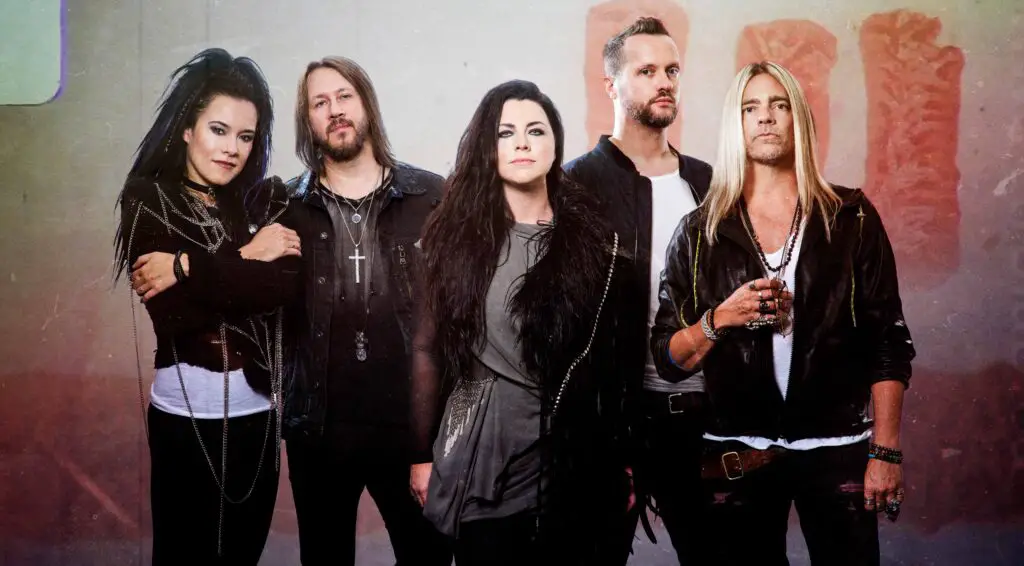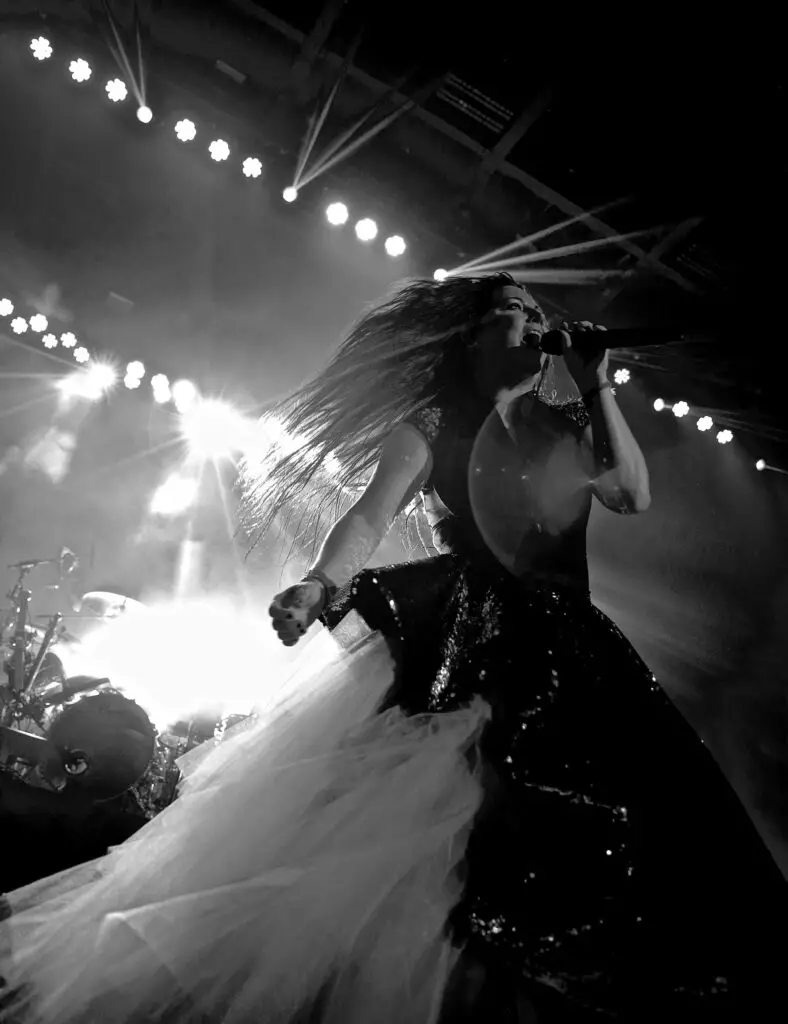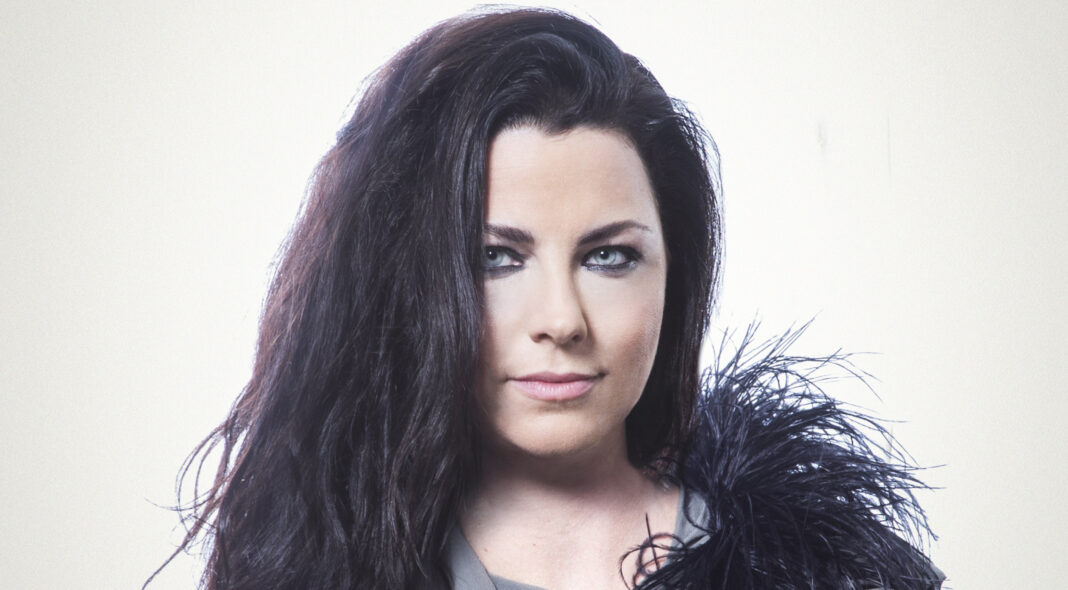Even over the phone, Amy Lee’s presence is soothing. She’s achieved, or earned, a level of calm that comes only with experience, offering her insights and occasionally letting out a big, infectious laugh. At home in Nashville with her husband and six-year-old son, the Evanescence frontwoman’s life has taken a change of pace after moving away from New York last year. She’s been leaning into her new languid lifestyle, particularly after the pandemic began. “I was like, ‘sweet, I’m gonna make homemade dumplings and spend time with my son’ more than anything. I was grateful for that, because we were about to go off on tour and we were going to be apart for a bit,” she tells me.
Ever the workaholic, however, it didn’t take long before Lee was intimidated by the empty space in front of her, and she started to create. “The music is saving me. I’ve gotten to a place now where I am kind of overwhelmed by all of the work I’ve put on top of myself. But honestly, it feels so much better than doing nothing,” she confesses. “Anxiety just takes over. Being able to pour my frustrations and my feelings and my energy into making something that I love and believe in has been saving my life.”
BEING ABLE TO POUR MY FRUSTRATIONS AND MY FEELINGS AND MY ENERGY INTO MAKING SOMETHING THAT I LOVE AND BELIEVE IN HAS BEEN SAVING MY LIFE.
amy lee
Since 2011’s self-titled third album, Evanescence’s only release has been 2017’s ‘Synthesis’, a string and electronic reworking of their songs. For their 2020 album ‘The Bitter Truth’, Lee and her bandmates have been releasing songs one by one, a few of which they had recorded before lockdown. Like many artists, they found themselves “reinventing their process”, but as soon as she was able to safely, Amy Lee had most of the band isolate in her house for a month. “We had a really good, creative time, and then we just laid down tracks. The guys could go home and I could sift through the aftermath and try to finish all my parts.” Moving to Nashville has been serendipitous, as Lee lives close to their producer’s private studio.

This slow approach to their music was in the works long before isolation. “We were already setting out to do things differently this time. I have entered a new place, we all have, with our schedule and our life and our process. I’ve kind of realised the freedom of not trying to take everything all on at once,” she says before describing their old routine: even hearing it is exhausting. Being together for so long was creatively stimulating, but with the current situation, she also felt buoyed by the company: “We were just so grateful for it when we got together. It just poured out. It was like, oh, we did it! People! Humans! In an area where I know what to do, I can do this, this is something that I am good at. Thank God!”
Now, Lee is settling into “writing mode,” a process without a deadline. “I’m trying to just be patient with myself because I can’t force it. It’s not something I can completely control.” She’s been pushing herself into new territory lyrically, as with ‘Use My Voice’, the third single from “The Bitter Truth”, featuring women like Taylor Momsen of The Pretty Reckless and Halestorm’s Lizzy Hale. Opening with simple piano and Lee’s vocals, it builds to righteous fury as Lee insists “don’t you speak for me”.
Lee started writing the song when she heard assault victim Chanel Miller’s powerful impact statement in 2016: “I was crying, I was so moved. The big takeaway for me reading it was the power of her voice. It wasn’t complicated, it wasn’t full of legal speak, it was literally from the heart cutting like a knife through a room and an environment and a situation that was all about silencing her,” she goes on, impassioned and angry, “It was like, if we could just scrub you out, just be quiet, everybody’s life is going to be easier. But that doesn’t change what happened, and it doesn’t change the way that it impacted her.”
Her feelings around abuse of power and consent are palpable, and she chokes up as she explains just how powerful an impact Miller’s words had on her. “There are things that have happened to us that have affected us deeply that have to do with another person. To stand up and say that out loud is so difficult for so many reasons. It’s not just about you, it’s about them and what that means and the drama that that will potentially continue. Not wanting to be a victim, wanting to stand up, but when you think about the other people that it could inspire, the other women it could empower, that’s what it’s really for. That’s what it did to me.”
Lee is at once eloquent and enraged on the topics of consent and sexism, but it took her a while to get here. Worried about dividing her fanbase, she kept her opinions separate from the music until she felt like it was no longer an option. “I finally had to change my rule. I’ve never, ever, ever talked about politics at all before. I feel like what we’re up against now is something that involves everybody.” She now believes in the power of speaking up: “The more the truth is in your face, the less that we can ignore it as a human race and as a society. The clearest and most straightforward way you can help promote change is just to promote truth.” As she tells it, she finally reached her “fuck it” point: she stopped caring who she lost.
I FINALLY HAD TO CHANGE MY RULE. I’VE NEVER, EVER, EVER TALKED ABOUT POLITICS AT ALL BEFORE. I FEEL LIKE WHAT WE’RE UP AGAINST NOW IS SOMETHING THAT INVOLVES EVERYBODY.
Amy lee
That wasn’t always the case, and while Lee often found herself the only woman in the room in rock in the early 00s, she never wanted to complain. “A word that I felt ringing in my head a lot in the beginning was ‘diva’,” she laughs, but adds: “That’s how they keep you down, by making you feel like you’re being demanding.” In 2003, when Evanescence broke through, she felt that rock music had “taken a turn for the dudes”, and she didn’t see herself represented either onstage or behind the scenes. That issue extended to the press, and she found herself being misunderstood by male journalists: “In general they aren’t going to completely understand me, so obviously they’re not going to be able to relay my story right. It’s going to be through a filter,” she says, adding, “My only voice almost always came through a male filter.”
Her fight started at the very beginning, with Evanescence’s first single and perhaps most recognisable song, ‘Bring Me To Life’, which opens with her stunning vocals and piano before leading into nu-metal style rapping by guest vocalist Paul McCoy. McCoy came in as a result of her label feeling they needed to show audiences something “familiar”. “The fact that it was a woman and a piano that started the track was just too much,” she laughs, adding that they wanted a guy in the band full time, but she disagreed. “I had to think we were being dropped for that because I said no. Eventually we came to the compromise that we only had to do it on one song and it could be a guest vocalist. That was really hard for me because I had to start out with our first song feeling like I made a sacrifice on my art.”
I HAD TO START OUT WITH OUR FIRST SONG FEELING LIKE I MADE A SACRIFICE ON MY ART.”
Amy Lee, on the release of ‘Bring Me To Life’
While she looks back on ‘Bring Me To Life’ warmly now, Lee feels betrayed that it was a choice she had to make at all: “If that song, like that, was the only thing people ever heard of us on a mainstream level and then we went away, I would be not happy. I would be very disappointed in my career, because I would have felt really misunderstood and like I should have stood up for myself in the first place. Luckily I did stand up for myself, but I would have wished that I’d tried harder. We did survive it, thank god.”

Lee is candid on the issues that matter to her, and I ask her if she’s become emboldened as she’s gotten older. “Yeah. Perspective is a lot. Becoming a mom gave me an element of that,” she pauses, sounding like she’s choking up. “Also, great tragedy. I lost my brother two years ago,” she answers after a few beats. Lee’s brother Robby died in early 2018 at just 24 years old after a lifelong struggle with epilepsy. That grief has impacted how Lee experiences the world: “It was one of the very hardest things that’s ever happened to my family and in my life. When something like that happens, you do gain perspective on what’s important and what there truly is to fear and to lose. When my perspective is on something that’s so much more important than if people on the internet don’t like me, I don’t care.”
WHEN SOMETHING LIKE THAT HAPPENS, YOU DO GAIN PERSPECTIVE ON WHAT’S IMPORTANT AND WHAT THERE TRULY IS TO FEAR AND TO LOSE. IF PEOPLE ON THE INTERNET DON’T LIKE ME, I DON’T CARE.
Amy Lee, on the tragic loss of her younger brother
Despite that tragedy, she hasn’t let her experience harden her. Instead, it’s only strengthened her perspective, giving her an optimistic outlook: “You know, death is a part of life,” she tells me, still sounding like she might be crying. “Nobody can escape our mortality. It’s just a truth,” she adds, but she’s keen not to sound pessimistic. “It doesn’t mean being an all-black wearing vampire and hating the world. It’s the opposite. It’s about seize the day. I think it’s important to recognise our mortality, because for me, the perspective that that gives me is that I want to make time for what’s truly important. I want to spend time with the people that I love right now while I can.”
Lee insists that acknowledging death isn’t morbid. She credits it with helping fight against her depression: “Today is not a bad day. Today I’m not in the ICU, today I’m not at a funeral, and there are other days in my life where I have been and will be. So take today and try to appreciate it. It’s not even about being productive, it’s about, let there be something, some peace and life in your heart because today is the day that you are alive.” That grief has forced her to reevaluate who she has and what she needs in life, making an effort to reconnect with her other siblings as often as she can.
Amy Lee has been in the music industry for over two decades, forming Evanescence at just 14 before being thrust into the public eye in her early 20s. Now 38, she’s experienced the best and the worst of being a woman in an often masculine world, and over those decades she’s become a lot of things: a mother, a sister, a goth icon, but above all a woman with admirable humanity. It’s clear to speak to her that she hasn’t let her experiences, with misogyny or grief, harden her; she’s instead developed a radical tenderness. Her final word on getting through grief without losing yourself is to recommend journaling: “Write things down so you have them, because you’re going to forget. If there’s one thing you can always have it’s your memories with that person. That’s how you keep them alive.”








I loved the interview, it was warm and honest, Amy is a great artist.
I am a huge fan and saw Amy with Lindsay at Cynthia Woods Pavilion in Houston in 2019. I enjoyed the article and get what she is saying but she mentioned Politics and did not really say which way she believed. Does she want Freedom in our country or is she saying she wants to go with the Biden Socialism? I believe Amy is younger than me. I am a 62 almost 63 yr. old on November 13th. I suffer from anxiety and ADD. Things have been hard with many illnesses that I have had to endure. My Kids are adults at 39 and 41. My oldest is a Psychologist. I am scared to death of what this country will become if the Liberals get into office. I still want to live in a Republic and have the freedoms our godfathers fought for. Just thinking of the way things would change for the worse if Biden would become President makes me have major panic attacks and a horrible feeling of Room. I pray Amy when mentioning politics is not wanting change with Biden. President Trump may not be perfect to some but he does want the best for our country. I want that too! I want to Love our Country, salute our flag and say the pledge. To respect our military and Police officers. I am terrified of what the Liberals plain for our nation. I was told I would never have kids and had 2 miricles. When I hear of up to 9 month old abortions it makes me cry. That is the kind of world to expect if Biden wins. Because if Biden wins…We the people LOSE! PLEASE PLEASE tell me you r not talking about change and politics involving Biden.
Forfathers not godfathers. Sorry